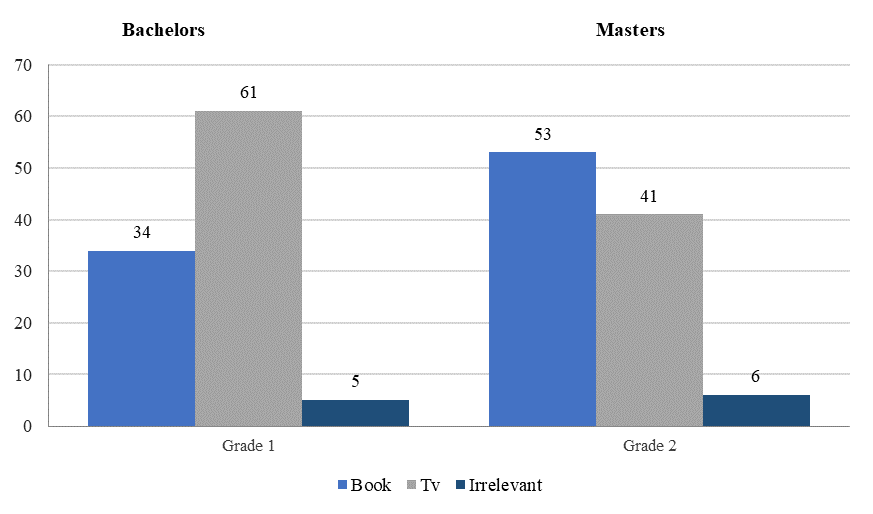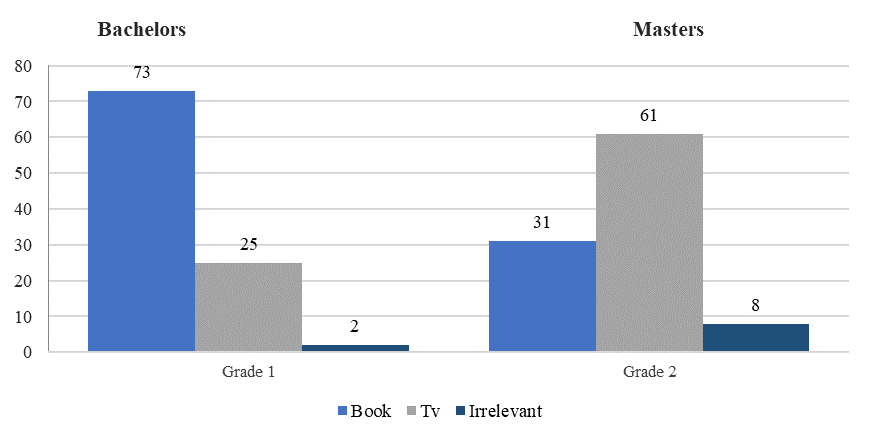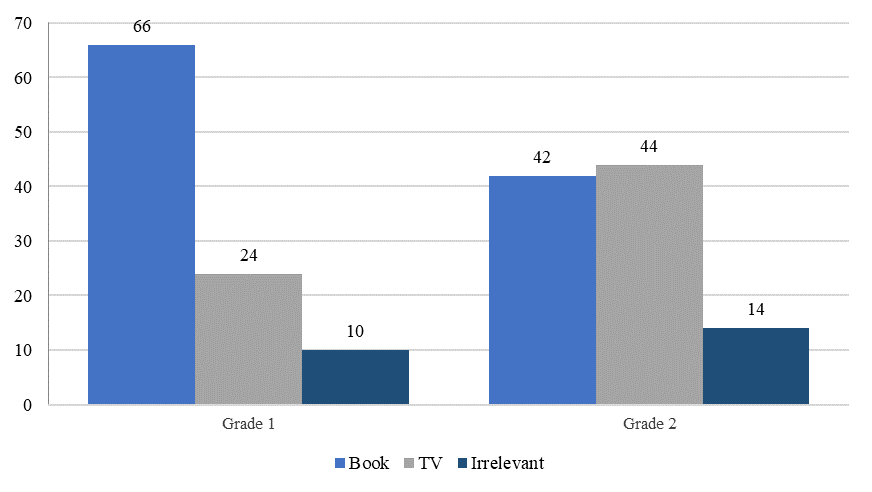Abstract
The article explores various factors determined by new information technologies that motivate students to acquire new knowledge. The authors focus not only on the positive effect obtained from the use of information technology in the educational process. Particular attention is paid to the ambiguous impact of computer technology on the younger generation. It is shown that the possession of information technology is not only a criterion for the level of general preparedness of a student, but also serve as a motivation for further studies. Information technology can act as a stimulus for young people in the context of the development of global communication systems. The factors that play a fundamental role in the formation of motivation for more effective knowledge acquisition are analyzed. In the concepts of the development of national education, modern information technologies have a different place. High-tech education, based on spiritual and moral values, encourages students to further a cognitive act that can last a lifetime.
Keywords: Information technologyeducationeducational processmotivationinformation
Introduction
The interdependence between the degree of use of information technology and the level of motivation for education is being updated in the context of a change in the sociocultural paradigm. The introduction of new information technologies in the educational process cannot be spontaneous, since students need an adaptation period to adapt to the new technological reality. At a certain historical point, this process can be considered as a kind of attempt to form a single educational space based on an electronic basis. That is why forms and means of instruction, the basis of which are information technologies, are an important characteristic of modern education. In recent years, such approaches have begun to crowd out traditional methods, gradually constituting a leading direction in any learning process. Ursul (2010) rightly draws attention to this trend: education that uses new information technologies should become the core of the information society and one of the priority mechanisms for further development, indicating increased attention to all informational aspects of the educational process. Therefore, there is a need to develop a fundamentally new complex of motivations is also due to a change in subject-object relations in the educational system itself, which is manifested in the following
1) the periodic lag of the teacher from the student in terms of mastering information technology, which is regularly updated;
2) the ability to control students' knowledge at a distance involves the development of a new set of incentives for learning;
3) the preference of a computer over a book, characteristic of a modern student, can violate the traditional relations between participants in the educational process.
We can agree with Colin (1995), who was one of the first to focus on the changing role of the teacher under the influence of information technology. In modern global education, the teacher is gradually becoming the central figure of the coming era, and his main weapon should be information based on scientific knowledge, where the main tool is informatics and information technology. In this connection, the teacher naturally changes the motivational tools used in the modern educational process. In particular, in order to increase the efficiency of material transfer, the activities of the teaching staff must be directed to a set of methods and forms of training in a single complex through the intensification of independent work. The dominance of teaching technical equipment based on the latest information technologies has forced the adjustment of educational standards. According to modern standards, at least half of the study time should be allocated to independent work, so this area of teaching is gradually coming to the fore.
Another important area that determines the development of a new set of motivations for learning is caused by the fact that the euphoria of the 90s. 20th century, associated with high expectations from the introduction of a computer in the educational process, gradually dissipated. Hopes for a directly proportional increase in the effectiveness of the educational system did not materialize. New methods are finding more and more supporters, as their advantages are becoming more apparent. For example, the use of an interactive glossary as an additional source of educational information allows you to master a more significant amount of theoretical material. In addition, the control system is radically changing, because the student has the opportunity to quickly find out the grade for the work done. A set of software, technical, and educational and methodological tools that provide active individual educational activity of students, as well as the use of animation and thematic presentations in electronic courses increase the level of students' assimilation of the material in question (Borisenko, 2011).
Problem Statement
The problem that this article reveals is caused by the active use of information technologies in the educational sphere, since this process coincided with a change in the sociocultural paradigm, which to the maximum extent affected the students' motivation to acquire new knowledge. The emergence of new sources of information that provided students with the opportunity to quickly obtain alternative knowledge led to a violation of subject-object relations in the educational system.
Research Questions
The introduction of new technologies not only significantly changes the system of traditional forms of instruction, but also helps students to master complex theoretical material, stimulating their cognitive activity. This may be a game that;
... proceeds in one or another subjective form of communication, primarily at the information level, in the form of symbolic interaction, interdependence of each other’s actions, when each observed act of activity has a social significance and therefore is a social sign (Vetrenko, 2003, p. 15).
All this allows you to motivate the student not only to the timely completion of specific tasks, but also stimulates him to regularly update knowledge. Students independently motivate a particular discipline to also be motivated by elements and settings of a modern training course.
It can be argued that the increasing motivation to study in a paradigm shift is largely due to the active penetration of information technology in the educational process. However, the process of successful use of electronic learning tools is duly determined by an individual approach to the organization of the educational process, and appropriate control when managing the educational process itself. In order to use all the channels of perception of a student, a significant part of the theoretical material can be presented for independent study. With this approach, a wide variety of techniques is used, because in the context of the expansion of the educational information space, the individualization of cognitive activity is intensified, when various ways of presenting the material become popular (Strelchenko, 2006). As a result of using such approaches, the range of motivations for getting deeper knowledge becomes more diverse among students, which increase in proportion to the requirements of society. However, new techniques based on high information technologies in recent years have demonstrated their effectiveness at all levels of the educational process, not only in classroom settings, but also as a result of independent work. In this case, the effectiveness of educational activities increases significantly, because not only does the range of interactions of all subjects of the educational process expand, but the motivation for their activities also becomes more definite. It can be argued that the level of motivation among students is largely due to the adequacy of the knowledge gained to the modern problems of the development of civilization. In the context of globalization, the educational system is gradually becoming more and more varied, therefore curricula can be quickly transformed in accordance with the actual needs of society (Ignatiev & Rozanov, 2008).
Contrary to popular belief about the decline in the role of the “classical” teacher in the information age, our research proves the opposite: the role of the teacher in global information education changes significantly, but there is no need to talk about its decline. On the contrary, in the context of informatization of education, the role of the teacher in the organization of the educational process is significantly increased. In parallel with this, the requirements for the teacher himself are increasing he must possess a high level of information technology in order to ensure the freedom of student self-actualization through creative growth. The emergence of new motives that stimulate educational knowledge is fully consistent with the law of the Russian Federation “On Education”, which states that it should perform several important functions: a) promote self-determination of the person; b) create conditions for personal self-realization; c) to form a person and a citizen who is harmoniously integrated into his modern society and is aimed at improving it (Krasheninnikov & Kruglova, 2008). It is important to emphasize that the educational system implements the priority goals of preparing a person who is in demand at a certain historical stage. Such a person is needed for the successful functioning of society, since the ultimate goal of modernization in the vocational education system is to ensure its qualitative transformation in the context of the global market economy (Vasiliev, 2006). Currently, the content and methods of educational activity are used to reduce the conscious independence of students, which requires a more creative approach to the use of information technologies in the educational process, so that at the exit they contribute to the formation of a highly qualified specialist, independent person and citizen. The content of the educational program, which is aimed at mastering key and professional competencies, allows you to quickly respond to changes in the labor market. Continuity of vocational education throughout a person’s life, as well as the transition from subject-based learning to interdisciplinary-modular, based on competency-based, provide the flexibility of vocational education aimed at studying a particular profession (Melekhina, 2008). Modern information technologies motivate the further development of new forms of student independent work. Thanks to such activities, a more effective approach to a specific form of the educational process on the part of the administration, as well as students, is achieved.
Purpose of the Study
The purpose of the article is to prove an important thesis: if it is possible to develop new ways of interaction between traditional sources of educational information and knowledge obtained from alternative sources, then on this basis we can create author's methods of teaching leading academic disciplines, stimulating the motivation of young people to effective educational activities.
Research Methods
A study of the role of the latest information technologies in increasing motivation to study was carried out at the Siberian Federal University. This study is responsible for identifying factors and conditions that allow students to choose more effective methods of independent work, namely, to receive answers to the following questions:
At what level do students evaluate their level of secondary full education;
whether students consider it important to do independent work to improve their educational level;
how actively information technologies are used in the course of independent work.
To form a sample, the nesting method was used, in which a study group is selected as the subject of the survey, followed by a continuous survey of students in it. Information was collected by the questionnaire method. In total, 231 people took part in the survey within the framework of this study.
Findings
A study of the role of the latest information technologies in increasing motivation to study was carried out at the Siberian Federal University. This study is responsible for identifying factors and conditions that allow students to choose more effective methods of independent work, namely, to receive answers to the following questions:
At what level do students evaluate their level of secondary full education;
whether students consider it important to do independent work to improve their educational level;
how actively information technologies are used in the course of independent work.
To form a sample, the nesting method was used, in which a study group is selected as the subject of the survey, followed by a continuous survey of students in it. Information was collected using the questionnaire method. In total, 231 people took part in the survey within the framework of this study.
Important factors that influence the success of independent work are considered to be priorities in the students' choice of information sources: traditional textbooks in the form of books or the Internet. The survey revealed that the proportion of students who prefer a monitor screen to a traditional textbook is 62.3 %. This indicates the dominance among students of Siberian Federal University electronic information carriers. Moreover, the difference between the answers of undergraduate and graduate students is very insignificant (61.1 to 65.2 %). Among the reasons for this attitude, students named the following reasons (Table
The sum of the answers sometimes exceeds 100%, because the respondents were able to mark several answers.
Although students prefer a computer to a book, nevertheless, opinions about the need for direct communication between the student and the teacher were significantly divided. Students were invited to speak about the nature of their interaction with teachers: personal communication or computer-based communication. When processing the results of the survey, the answers were distributed as follows (Table
Students named the importance of direct communication (verbal and non-verbal contact) for understanding the material (75.8 %) and the ability to generate and ask new questions (69, 9 %) as the main reasons for choosing through dialogue (Figure


Processing this survey allows us to draw a number of conclusions. Firstly, students are more in need of a teacher who owns information technology. Secondly, the constant updating of information technology training does not provide directly proportional to the effectiveness in the educational process (Figure

The data in undergraduates of the same department are somewhat different (Figure
Firstly, the status of a master initially implies a large degree of independence, which is manifested in the intensity of contacts with the teacher.
Secondly, a significant percentage of masters has, albeit minimal, but still practice solving industrial problems, which involves the development of their individual mechanism of motivation to study, which is more selective.
Thirdly, the initiator of the educational dialogue is more often the master himself, and not the teacher, which indicates, in particular, the formed epistemological scale of the student, more clearly representing the boundaries of his “ignorance”
Conclusion
Thus, we can distinguish several leading areas in educational activities, which indicate an increased motivation to acquire new knowledge under the influence of the latest information technologies. Firstly, communication between the subjects of the educational process through an electronic course provides more opportunities to consider the individual epistemological capabilities of each student. Secondly, the consequence of most communications that occur through electronic learning tools at the level of the educational space contributes to the formation of a creative atmosphere (Pfanenstil, Yatsenko, & Borisenko, 2013). Thirdly, the relationship between the student and the teacher takes on a creative and cognitive character, since communication takes on a more visual, figurative character, while covering a wider range of knowledge.
References
- Borisenko, I. G. (2011). Innovative technologies in teaching descriptive geometry in the formation of professional competencies. Vestn. ISTU, 12(59), 355–357.
- Colin, K. K. (1995). Information technology – a catalyst for the development of modern society. Inform. Technol., 1, 2–8.
- Ignatiev, V. I., & Rozanov, F. I. (2008). Education in the Information Age. Philos. of Ed., 2(23), 76–85.
- Krasheninnikov, V. V., & Kruglova, N. R. (2008). Ensuring the quality of specialist training: a conceptual model. Philos.of Ed., 2(23), 126–131.
- Melekhina, E. A. (2008). The problem of goal setting in the modern system of higher professional education. Philos. of Ed., 4(25), 101–109.
- Pfanenstil, I. A., Yatsenko, M. P., & Borisenko, I. G. (2013). Information technology and their role in the sustainability of the domestic educational system. Bull. of ISTU, 1(72), 274–279.
- Strelchenko, V. I. (2006). Educational alternatives to globalization. Human Philosophy and Modern Education (pp. 21–31). St. Petersburg.
- Ursul, A. D. (2010). Education in the information evolutionary perspective. Open Ed., 6, 89–97.
- Vasiliev, V. (2006). Youth science in an innovative university. Higher ed. in Russ., 7, 85–89.
- Vetrenko, I. A. (2003). Socio-historical status of the game in the space of freedom and necessity. Krasnoyarsk.
Copyright information

This work is licensed under a Creative Commons Attribution-NonCommercial-NoDerivatives 4.0 International License.
About this article
Publication Date
31 October 2020
Article Doi
eBook ISBN
978-1-80296-091-4
Publisher
European Publisher
Volume
92
Print ISBN (optional)
-
Edition Number
1st Edition
Pages
1-3929
Subjects
Sociolinguistics, linguistics, semantics, discourse analysis, translation, interpretation
Cite this article as:
Petrovich, Y. M., Andreevich, M. F., Georgievna, S. I., Aleksandrovna, M. T., & Vladimirovich, R. D. (2020). Use Of Information Technologies As An Important Factor Of Motivation To Learning. In D. K. Bataev (Ed.), Social and Cultural Transformations in the Context of Modern Globalism» Dedicated to the 80th Anniversary of Turkayev Hassan Vakhitovich, vol 92. European Proceedings of Social and Behavioural Sciences (pp. 3288-3295). European Publisher. https://doi.org/10.15405/epsbs.2020.10.05.437
